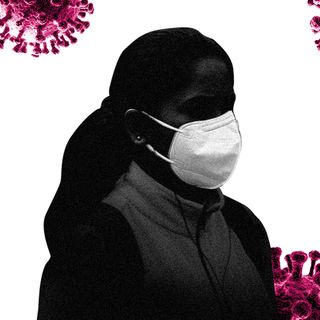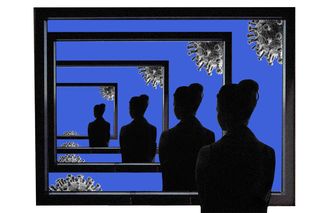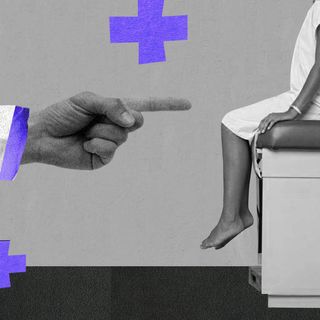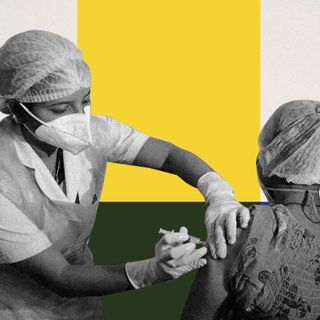
It Feels Like April 2020 All Over Again. This ‘Been There, Done That’ Vibe Is Called Déjà Vécu
Amid rising Covid19 cases and lockdowns, the French term for “already lived” seems eerily apt.

Covid19 cases are spiraling out of control. Hospital beds are full. Frontline workers are exhausted and undersupported. Lockdowns are getting underway. Travel bans are being instated. Politics appears to be playing with lives.
But we’ve been here before, right? Is it April 2021, or April 2020?
For many, a ‘been there, done that’ vibe is slowly, but strongly, taking hold. This creeping sense of nothing new — with the awareness that nothing is actually repeating — is known as déjà vécu. French for “already lived,” the term describes a sense of life events repeating themselves in a sort of time loop. It’s a cousin of the eerie mistaken memories of déjà vu, and some experts describe déjà vécu as a sort of constant state of déjà vu — a “remembering the present,” as a New York Times article once described the phenomenon. But whereas déjà vu is characterized by a startling or confusing familiarity, déjà vécu is so wearisome in its effect that it’s almost banal. After all — you’ve experienced it all before. What would startle you?
Déjà vécu in the current milieu is understandable — the sheer volume of similarities between this time this year and this time last year is making it difficult to comprehend time has passed. Covid19-related news headlines, for instance, are oddly familiar — some even verbatim to a year ago — making it hard to discern the differences between then and now.
Related on The Swaddle:
Why Can’t We Remember Our Dreams
Relatedly, research shows older people, for whom novel experiences are rarer, report fewer feelings of déjà vu. “[Older people] say, well, they’ve just done so much that it is quite possible they’re confused because they did already do something very similar,” Chris Moulin, Ph.D., a cognitive neuropsychologist, explains in an interview with the CBC.
The voluntary (and now enforced) social distancing in the time between now and then has limited our ability to have new experiences and create new memories that might serve as a foil to déjà vécu; it doesn’t help that the near future also looks bleak in its potential for variety. The question is, what does living in a chronic state of sameness and replay do to us?
The answer may lie in Moulin’s research. For decades, Moulin, one of the world’s leading experts on déjà vu, has been studying people who display pathological déjà vécu. There is a 23-year-old man who stopped watching television or listening to the radio because he had “encountered it all before.” There is an 80-year-old man who did the same because he “felt as though everything in his life had happened before.” There is a woman in her mid-20s who described all of her actions as feeling like “acting in a film that she had seen before.” There is another 70-year-old woman who “quit playing tennis, claiming that she knew the outcome of every rally.” And a 77-year-old woman who “would claim to recognize details of restaurants she had never been to, and occasionally greeted total strangers as if she’d met them before.” All lacked the awareness that their constant sense of familiarity, recognition, and recollection was false — to them, it was real.
This state of constant reliving can be isolating. Some of these people — mostly those who also suffered from other, age-related cognitive declines — gradually withdrew from the world that held nothing new for them. Amid the existing physical and social isolation of the current pandemic, this kind of withdrawal could be a legitimate concern for those with non-pathological déjà vécu, for whom life really feels repetitive, even though they know it’s not.
But one of the case studies above stands out as a better example. The 77-year-old was described as having a sense of humor about her déjà vécu; she and her family would joke about her mistaken recognition, and at the time of reporting, lived a rich, full life with a mind otherwise cognitively sharp. Humor, in various forms, has been linked to psychological well-being and resilience, as well as cognition and intelligence.
Perhaps, the antidote to our current cultural déjà vécu lies in acknowledging the absurdity of it all. So go on — laugh till you cry. Or cry while you laugh. Either way, we might get a little bit of the catharsis — and novelty — we need to keep going.
Liesl Goecker is The Swaddle's managing editor.
Related


Indian Women Feel Shamed, Harassed by Doctors. How Can Health Care Treat Women Better?
